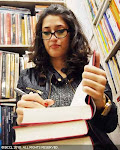
SUKANT DEEPAK
No talking about her skin-hugging jeans or the lovely black boots. Not a whisper about the way her long fingers caress her hair and make you so glad to be alive the moment you’re in front of her.
“Why is your guy taking so many pictures?” she asks. You die. Why can’t there be a holy war against those who take her pictures?
Author Fatima Bhutto can easily overshadow anyone on the third day of the Jaipur Literature Festival. Oprah Winfey included. And she wants to talk serious. Only serious.
A young, intelligent woman like her in the Pakistani society which seems to be falling apart — rising inflation, starvation, an army which may take over anytime... Is something wrong in the state of Denmark? The celebrated author offers a fascinating smile, “It must be understood that in the Pakistani society, the gulf between those in power and the ones who are being ruled has been widening at an alarming rate, with the former choosing to be absolutely insensitive towards the issues concerning the masses. Do you know, millions are starving, there is a tremendous energy crisis. In my country, people stand on one side. Power stands on the other. Sad, but true.” But there must be a silver lining. “Of course there is, interesting things are happening. People are trying to make themselves heard. Judiciary is waking up. However, the real issue still remains — people. Read the newspaper headlines in Pakistan; they all scream of who will get the power. Why do we fail to understand that power doesn’t ‘belong’ to anyone. It is very complex phenomenon.”
Mention the never-before role being played by the civil society in Asia in recent times, like Anna Hazare’s crusade against corruption in India, and the lawyers’ protest in Pakistan, and Fatima is quick to respond, “Who is the civil society? Do you know that most people in Pakistan may not even know about the protests being held, thanks to the fact that there isn’t enough electricity to feed their television. And also, why do we take only Lahore, Islamabad and Karachi into consideration while talking about Pakistan? Again, the issue of ever-growing gulf emerges. The most important issues including food, health, land reforms, energy aren’t taken up by the civil society. The problems being faced by far-fetched parts of the country are being ignored. Why aren’t we being sensitive to the needs of the majority? It’s so surprising!”
Now they say that for young Pakistani, India is no longer the enemy… “Yes, America tops the list. That’s because their occupation of Afganisthan is illegal and unjust. The drone attacks inside Pakistani territory are testing our patience like never before. I really wonder how many more Pakistani soldiers will need to be sacrificed at the American hands for us to realise that we don’t need them.”
As an educated young woman, does she feel that feudalism, still a dormant part in the Pakistani society also has a lot to do with the present-day chaos in Pakistani, though she also belongs to a huge landed family. “Sure, it is one of the factors, but then in every sphere- be it the industry, political power or any other institution, only a handful have all the power in that country.”
She has already made it clear that she would not join politics but remain a “critic”. So, how does she perceive the rise in former cricketer Imran Khan’s popularity? “Yes, he does have a personality. The question is whether he’s any different from the other politicians? The guy has always made it clear that he’s pretty cozy with dictatorship. He supported Zia, he has defended Musharraf. And yes, as a woman, I will worry if he comes to power. If you know, he has voted against the woman’s bill and his views with regard to the fairer sex are very orthodox. Don’t forget, that in 2009, he voiced that he was in favour of the Shria law.”
Bring up Kashmir, and she’s quick to respond, “It would not be fair to comment on this issue as there is no Kashmiri in attendance…”
Signing an autograph for a Canadian fan, she whispers, “Also, don’t you think internal borders restrict us to a great extent…?”
Source:http://www.dailypostindia.com/news/10234-intelligence-is-sexy-period.html






